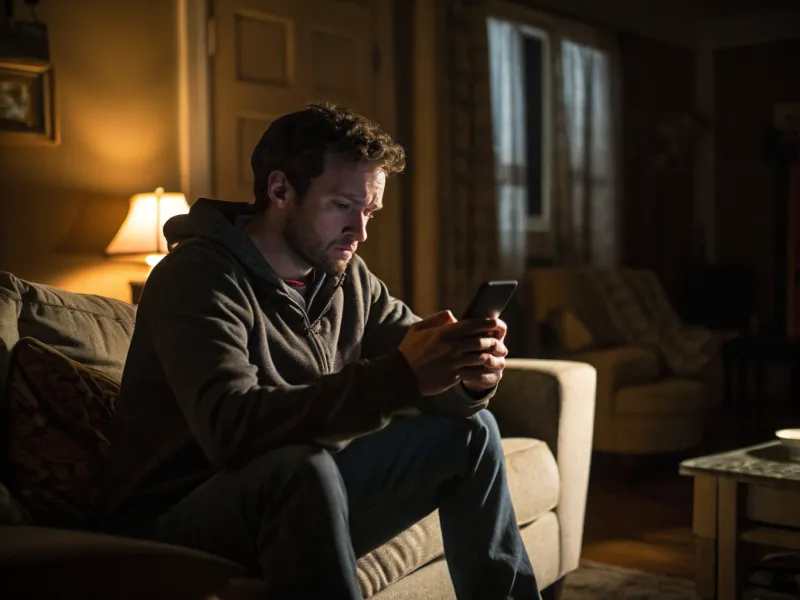34 Big Dating Red Flags You Really Shouldn’t Brush Off
Navigating the dating world can be a thrilling adventure, full of excitement and anticipation. However, amidst the butterflies and dreamy dates, there can be subtle hints—red flags, if you will—that are easy to overlook but crucial to recognize.
Ignoring these signs can lead to misunderstandings or heartache down the road. So, here’s the scoop on 34 dating red flags you definitely shouldn’t ignore. Trust your instincts and let’s break it all down.
1. Comportamiento excesivamente celoso

When your partner constantly questions your whereabouts or who you’re with, it’s a huge red flag. Jealousy can be flattering in tiny doses, but when it becomes a regular thing, it transforms into an unhealthy obsession. Imagine this: You’re out with friends, having a great time, and your phone buzzes. It’s them, not to check in sweetly, but to interrogate you about who’s there with you. Yeah, major yikes!
Nobody enjoys feeling like they’re under surveillance. A healthy relationship thrives on trust and mutual respect. If your date is constantly suspicious, it may point to deeper insecurities or possessiveness that could escalate. Trust me, it’s not something to brush off lightly.
Anecdote time—I had a friend who couldn’t meet us for brunch without their partner calling multiple times to “see if everything was okay.” Spoiler: it wasn’t. They ended up feeling trapped rather than treasured. You deserve someone who trusts you and doesn’t need a GPS tracker to feel secure. So, if jealousy rears its ugly head, it’s time to seriously reconsider.
2. Crítica constante

Imagine being with someone who always has something negative to say about you, whether it’s your choice of clothing, your laugh, or even your goals. Constant criticism, disguised as “constructive feedback,” can chip away at your self-esteem. It’s like being in a relationship with your most negative inner voice but in 3D!
This is significant because no relationship is perfect, and differences are natural. However, when criticism outweighs compliments, it’s a problem. A supportive partner should lift you up, not drag you down. The issue is when this behavior becomes the norm, making you second-guess your every move.
I once dated someone who would always point out my “flaws” under the guise of being honest. At first, I appreciated the candor, but over time it made me feel inadequate. You deserve a cheerleader, not a constant critic. If your partner can’t celebrate the wonderful person you are, it’s time to hit pause and reflect. Remember, love should empower, not belittle.
3. 3. Falta de comunicación

Picture this: You’re trying to discuss something important, and your partner either shuts down or changes the subject. Falta de comunicación is a glaring red flag. It’s like trying to have a conversation with a wall. Frustrating, right?
Communication is the backbone of any relationship. Without it, misunderstandings and resentment build up quicker than you can say “We need to talk.” If your partner is unwilling to engage in meaningful dialogue or dismisses your concerns, it’s a sign that they might not be emotionally invested.
There was a time when I was in a relationship where every serious topic was dodged like a bullet. It left me feeling unheard and unimportant. Relationships require honest, open exchanges to thrive. Don’t settle for someone who can’t or won’t communicate effectively. Your thoughts and feelings deserve to be acknowledged and respected. If it feels like pulling teeth to get a conversation going, it might be time to reconsider the dynamics.
4. Falta de respeto hacia los demás

Ever notice how your date treats waitstaff or anyone they consider below them? Disrespect towards others is a huge red flag. It’s indicative of a person’s true character, revealing how they might treat you in the future, especially when they’re comfortable.
I went out with someone who snapped at the barista for getting their order wrong. Sure, we all have bad days, but consistent disrespect is inexcusable. It’s not just about that moment; it shows a lack of empathy and kindness, which are fundamental traits for a healthy relationship.
Think of it as a preview of how they might behave when the honeymoon phase ends. If they can’t show basic respect to strangers, chances are, it won’t be long before that behavior trickles into your interactions. Everyone deserves a partner who treats others with decency and respect. Life’s too short to waste on someone who feels superior to everyone else.
5. Evitar el compromiso

You know that feeling when you’re ready to take the next step in a relationship, but your partner keeps evading the topic? Avoidance of commitment is a red flag that can’t be ignored. It’s as if they’re stuck in neutral while you’re ready to accelerate.
Some people genuinely fear commitment, and that’s okay, but it’s important to have clear, honest conversations about where you both stand. If you find yourself repeatedly asking about “where this is going,” and getting vague responses, it’s time to pay attention.
I once dated someone who would change the subject every time the future came up. It left me feeling unsure and unimportant. A relationship should be a partnership, with both parties sharing similar goals and timelines. If they’re dodging the commitment conversation, it might indicate they’re not as invested as you are. Don’t ignore this sign—clarity is crucial for your emotional well-being.
6. Irresponsabilidad financiera

Dating someone who’s financially irresponsible can lead to stress and conflict. Financial habits often reflect broader life management skills, so pay attention to how your partner handles money.
If they’re constantly borrowing money, making impulsive purchases, or dodging bill payments, it’s a sign of deeper issues. It’s not about judging them for not being rich, but about how they manage what they have. I dated someone who would spend lavishly on nights out and then scramble to borrow money for rent. It wasn’t the lack of money that was concerning, but the lack of planning.
Money talks are not romantic, but they’re necessary. Financial compatibility is crucial, especially if the relationship becomes serious. If you notice reckless financial behavior, have a candid discussion about it. It’s important to find someone who shares your financial values and goals. Before things get too serious, ensure there’s financial transparency and responsibility in the relationship.
7. Actitud negativa

Being with someone who carries a perpetual cloud of negativity can be draining. A consistently negative attitude is a red flag that can overshadow the joy in a relationship. It’s like having a rain cloud follow you around, even on sunny days.
I dated someone whose outlook on life was perpetually pessimistic. No matter the situation, they’d find something to complain about. While everyone has bad days, a chronic negative attitude can affect you too. You might find yourself feeling more down than usual, just from being around them.
Positivity and a good sense of humor can help navigate life’s ups and downs. If your partner is always seeing the glass half empty, it’s time to assess how it impacts you. Relationships should be uplifting, not overshadowed by constant gloom. Be with someone who can find joy and laughter in everyday moments. Surround yourself with positivity, it’s contagious!
8. Excesiva dependencia de usted

When your partner relies on you for everything—from emotional support to decision making—it’s a red flag. Overdependence can feel flattering initially, but it often leads to imbalance and pressure, making you feel more like a caregiver than a partner.
Picture this: Every decision, whether big or small, falls on you. Shouldn’t relationships be a partnership rather than a parent-child dynamic? I once dated someone who needed constant reassurance and couldn’t make a decision without me. It was exhausting and took a toll on my own independence.
Encouraging independence is crucial for a healthy relationship. Both partners should bring their own strengths and support each other without losing themselves. If you’re feeling overwhelmed by your partner’s reliance on you, it might be time to encourage more balance. Everyone deserves a partner who stands on their own two feet, ready to walk beside you, not be carried.
9. 9. Mentira y engaño

¿Ha pillado a su pareja mintiendo? Hasta las pequeñas mentiras blancas importan. La mentira y el engaño son señales de alarma que minan la confianza, la base de cualquier relación.
I once dealt with a partner who lied about everything, from small details to major life events. Initially, it seemed harmless, but over time, it eroded trust. When you can’t believe what your partner says, it creates a barrier, leading to suspicion and doubt.
Honesty is essential for a relationship to flourish. If you catch your partner lying, it’s vital to have a conversation about it. A healthy relationship thrives on transparency and truth. If deception becomes a pattern, consider the implications for the future. Everyone deserves a partner they can trust wholeheartedly. If lies are creeping into your relationship, it’s time to reassess where things are heading.
10. Comportamiento incoherente

One day, they’re showering you with affection; the next, they’re as cold as ice. Inconsistent behavior is a major red flag, leaving you questioning where you stand. It’s an emotional rollercoaster that can be both confusing and exhausting.
I’ve been there, with someone who changed like the weather. It kept me on my toes, but not in a good way. The unpredictability made it hard to feel secure, creating a constant state of unease. Consistency is key in relationships. It provides a sense of reliability and trust.
If you’re experiencing erratic behavior, it’s worth discussing. It might be indicative of deeper issues they’re dealing with, but it’s important to assess how it affects you. A stable relationship should feel comforting and predictable, not like you’re always waiting for the other shoe to drop. Seek someone whose actions align with their words, providing you with stability and assurance.
11. Luz de gas

El gaslighting es una táctica manipuladora where someone makes you question your reality. It’s a huge red flag that can be incredibly damaging. If your partner frequently dismisses your feelings or insists that your memories are incorrect, it’s a form of emotional abuse.
I had a friend whose partner would constantly tell them they were “too sensitive” whenever they brought up issues. Over time, it made them doubt their own feelings and perceptions. This behavior can erode self-esteem and create a toxic environment.
Trust your instincts. If something feels off, it probably is. Gaslighting can be subtle but its impact is profound. A healthy relationship should validate your experiences, not dismiss or manipulate them. If you suspect you’re being gaslit, it’s crucial to recognize it and set clear boundaries. Everyone deserves to feel secure and validated in their relationship.
12. Comportamiento reservado

Secrecy in a relationship is a significant red flag. If your partner is overly protective of their phone or has unexplained absences, it’s worth paying attention. Trust and honesty are the pillars of any strong relationship, and secrecy can crumble that foundation.
Una vez salí con alguien que siempre ponía el teléfono boca abajo y salía de la habitación para atender las llamadas. Me hacía sentir excluida y desconfiada. Aunque todo el mundo merece privacidad, un secretismo excesivo puede indicar falta de transparencia.
La clave es una comunicación clara sobre los límites y las expectativas. Si tu pareja es reservada, habla honestamente sobre cómo te hace sentir. Una pareja que te respeta estará abierta y dispuesta a hablar de sus preocupaciones. Si el secretismo persiste a pesar de los esfuerzos por abordarlo, puede que haya llegado el momento de reevaluar la relación. La confianza es esencial y te mereces una relación en la que se valore la transparencia.
13. Control del comportamiento

When your partner dictates how you should dress, who you can hang out with, or how you spend your time, it’s a major red flag. Controlling behavior is about power and domination, not love.
Tenía una amiga cuya pareja elegía su ropa y decidía qué amigos eran aceptables. Empezó con algo pequeño, pero se convirtió en un patrón de control que ahogaba su independencia. Una relación debe ser una asociación en la que ambos tengan la misma voz y la misma libertad.
If you feel like your autonomy is being compromised, it’s crucial to address it. Everyone deserves the freedom to make their own choices without fear or pressure. Love is about respecting and supporting each other’s individuality, not molding someone into who you want them to be. Stand firm in your independence and set clear boundaries. A healthy relationship will respect and cherish your freedom.
14. Historial de trampas

Descubrir un historial de infidelidad en su pareja es una señal de alarma crucial. El comportamiento pasado suele predecir las acciones futuras y un historial de engaños puede indicar problemas no resueltos con el compromiso y la honestidad.
I once dated someone who casually mentioned cheating in previous relationships. It made me wary and cautious. While people can change, ignoring such a history might mean ignoring a pattern. Trust is the foundation of love, and it’s hard to build with someone who has a shaky past.
If your partner has cheated before, have an open discussion about it. Understand the context and see if they’ve taken responsibility and made amends. However, be mindful of how this information makes you feel. If you can’t shake off the doubt, it might not be worth the risk. Trust your gut instinct—it rarely leads you astray. Everyone deserves a partner who is faithful and committed to the relationship.
15. Problemas de abuso de sustancias

El abuso de sustancias puede ser una señal de alarma importante, ya que a menudo indica problemas más profundos que deben abordarse. Puede afectar no solo al individuo, sino también a la dinámica de la relación.
If you notice signs of substance abuse, it’s important to approach the topic with compassion and support. Encourage your partner to seek help and be clear about how it affects you. It’s a challenging situation, but your safety and mental health should always come first. You deserve a healthy, loving relationship free from the shadows of addiction.
16. Relaciones pasadas no resueltas

If your partner frequently talks about their ex or maintains a close, secretive relationship with them, it’s a red flag. Unresolved past relationships can interfere with your current one, creating tension and insecurity.
Discuss boundaries and expectations regarding past relationships. A partner who respects you will understand your concerns and strive for transparency. If the past keeps creeping into the present, it could hinder the growth of your relationship. You deserve a partner who’s fully present, not stuck in the past. Emotional availability and commitment are key to building a successful partnership.
17. Emocionalmente no disponible

Being with someone emotionally unavailable is like chasing a moving target. They’re present physically but distant emotionally, making intimacy and connection challenging.
Emotional availability is crucial for a healthy relationship. It fosters connection, understanding, and growth. If you find yourself constantly seeking emotional intimacy that’s not reciprocated, it’s important to address it. Everyone deserves a partner who’s emotionally present and engaged.
Discuss your needs and see if they’re willing to open up. However, if they remain unavailable despite efforts, it might be time to move on. Love should be a two-way street, filled with emotional presence and mutual support. Don’t settle for less.
18. Mal genio

Una pareja con mal carácter es una señal de alarma importante. Los arrebatos frecuentes y los problemas de ira pueden crear un ambiente volátil e impredecible.
If you notice your partner has anger issues, it’s important to address it. Encourage them to seek help or manage their emotions better. Everyone deserves a peaceful, loving environment.
Don’t ignore signs of a bad temper, as it can escalate into more severe issues. You deserve a partner who handles conflicts calmly and respectfully. Love should be about understanding and patience, not fear and apprehension. Prioritize your well-being and emotional safety above all.
19. Falta de empatía

La empatía es la piedra angular de una relación sana. Una pareja carente de empatía puede tener dificultades para entender o atender tus emociones y necesidades.
If your partner consistently dismisses your feelings or fails to show compassion, it’s a red flag. Discuss how it affects you and express the importance of empathy in the relationship.
Building empathy takes time and effort, but it’s essential for long-term success. Everyone deserves a partner who listens and cares deeply. If empathy is lacking, it might be time to assess if the relationship meets your emotional needs. Seek a partner who values and nurtures emotional understanding.
20. Aislamiento de amigos y familiares

When your partner discourages you from seeing friends or family, it’s a red flag. Isolation tactics can be subtle yet damaging, leading you away from your support system.
If you notice attempts to isolate you, it’s important to address it. Everyone deserves the freedom to maintain relationships outside of their partnership. Love should be expansive and inclusive, not restrictive.
Comenta con tu pareja tu necesidad de independencia y de establecer vínculos. Si siguen desalentando estos vínculos, quizá sea el momento de reconsiderar la relación. Mereces que te apoyen en todos los ámbitos de la vida, incluidas tus amistades y lazos familiares. Confía en tu intuición y da prioridad a tu bienestar.
21. Abuso verbal

Verbal abuse is a significant red flag that should never be ignored. Hurtful words can leave lasting scars, impacting self-esteem and mental health.
If you experience verbal abuse, it’s crucial to recognize it and set boundaries. Love should never hurt. Everyone deserves a partner who communicates respectfully, even during conflicts.
Address the issue with your partner and express how their words affect you. If they’re unwilling to change, it might be time to leave. Your well-being and dignity should always come first. Seek support from friends, family, or professionals if needed. You deserve a relationship filled with kindness and respect.
22. Falta de apoyo a sus objetivos

A partner who doesn’t support your dreams and ambitions is a red flag. Mutual encouragement is essential for a thriving relationship. I once dated someone who laughed at my career goals, dismissing them as unrealistic. It was disheartening and affected my motivation.
Support from a partner provides strength and confidence. It’s crucial to have someone who believes in you and celebrates your achievements. If your partner consistently undermines your goals, it’s important to address it.
Comunique sus aspiraciones y la importancia de su apoyo. Una pareja cariñosa le escuchará y le elevará. Si falta apoyo, podría indicar una falta de alineación de valores. Busque una pareja que le dé poder y le apoye.
Todo el mundo merece perseguir sus sueños con el estímulo de su ser querido. Evalúe si su relación fomenta el crecimiento y la ambición. Tus objetivos y pasiones son importantes, y mereces una pareja que los reconozca y apoye de todo corazón.
23. Ruptura de promesas

Repeatedly breaking promises is a red flag in a relationship. It erodes trust and creates disappointment. I once dated someone who constantly canceled plans, leaving me feeling unimportant and frustrated. Trust is the foundation of love, and broken promises can weaken it.
Una pareja fiable debe cumplir sus compromisos y comunicar abiertamente si no puede cumplirlos. Si tu pareja incumple sus promesas con frecuencia, habla de cómo te afecta a ti.
It’s vital to feel valued and prioritized in a relationship. Everyone deserves a partner who keeps their word. If broken promises persist despite efforts to address them, it might be time to reassess the relationship.
La honradez y la fiabilidad son claves para generar confianza y seguridad. Busque una pareja que respete su tiempo y haga verdaderos esfuerzos por mantener sus compromisos. Tu felicidad y bienestar merecen ser prioritarios.
24. Coqueteo excesivo con otros

Excessive flirting with others is a red flag, signaling disrespect and disregard for your feelings. I once dated someone who couldn’t stop flirting, even in my presence. It was hurtful and made me question their commitment.
Respetar los límites es crucial en una relación. Si tu pareja coquetea en exceso, háblale de cómo te hace sentir.
La comunicación clara sobre los límites es fundamental. Una pareja cariñosa entenderá y respetará tus preocupaciones. Si el flirteo persiste a pesar de vuestras conversaciones, podría indicar una falta de respeto por la relación.
Everyone deserves a partner who values and honors their commitment. Seek someone who cherishes and respects you, without seeking attention elsewhere. Trust and respect are the pillars of a strong relationship. Don’t settle for anything less.
25. Indiferencia ante sus necesidades

A partner who’s indifferent to your needs is a red flag. Mutual care and consideration are essential for a thriving relationship. I once dated someone who dismissed my needs, focusing solely on their own. It felt lonely and unfulfilling.
Acknowledging each other’s needs fosters connection and understanding. If your partner is indifferent, express how it affects you and discuss the importance of mutual consideration.
Construir una relación amorosa requiere empatía y compromiso. Todo el mundo merece una pareja que escuche y valore sus necesidades. Si la indiferencia persiste a pesar de los esfuerzos por abordarla, puede indicar una falta de alineación de valores.
Seek a partner who reciprocates care and understanding. Your needs and happiness are important, and you deserve to be in a relationship where they’re valued and respected.
26. Dependencia malsana de la tecnología

An unhealthy dependence on technology is a red flag in modern relationships. Constant phone use can create distance and hinder genuine connection.
Si el uso de la tecnología es excesivo, hable de su impacto en la relación. Fomente el establecimiento de límites para el tiempo frente a la pantalla, especialmente durante los momentos destinados a estrechar lazos.
Todo el mundo merece una pareja que dé prioridad a la conexión en la vida real frente a las distracciones virtuales. Una relación amorosa se nutre de la presencia y la atención. Busca a alguien que valore el tiempo de calidad y la interacción significativa.
Evalúe si el uso de la tecnología se ajusta a los objetivos de su relación. Su tiempo y su presencia merecen ser apreciados y respetados. Construye una conexión que fomente la interacción genuina y las experiencias compartidas.
27. Falta de disculpas o de rendición de cuentas

A partner who never apologizes or takes accountability is a red flag. It’s crucial for growth and resolution in a relationship. I once dated someone who never admitted fault, leaving conflicts unresolved. Accountability fosters trust and understanding.
Everyone makes mistakes, but acknowledging them is key. You deserve a partner who takes responsibility for their actions. If apologies remain absent despite efforts to address it, reassess the relationship’s dynamics.
Seek a partner who values growth and resolution. Your feelings and concerns deserve to be heard and addressed. Build a relationship where accountability and understanding thrive. Don’t settle for anything less than mutual respect and growth.
28. Ignorar los límites personales

Respetar los límites personales es fundamental en cualquier relación sana. Si tu pareja ignora constantemente tu necesidad de espacio o intimidad, puede indicar una falta de respeto o comprensión. Esta señal de alarma suele manifestarse en pequeños actos que poco a poco se vuelven abrumadores.
It’s crucial to address these boundary issues early on. Have an open discussion about each other’s needs and agree on certain limits. By establishing mutual respect for boundaries, you can ensure both partners feel valued and comfortable.
29. Desinterés por sus pasiones

Sharing interests and passions can strengthen a relationship, but when one partner shows disinterest or dismisses the other’s hobbies, it can lead to feelings of neglect and undervaluation. This lack of enthusiasm might suggest that they are not fully invested in the relationship.
Encourage sharing of interests by taking turns to participate in each other’s hobbies. This not only enhances the connection but also fosters a sense of partnership and mutual appreciation. An open dialogue about personal passions can invigorate the relationship.
30. Cambios de humor frecuentes

Everyone experiences mood changes, but if your partner’s moods fluctuate unpredictably and dramatically, it may be a sign of underlying emotional instability. Such volatility can create an environment of uncertainty and stress in the relationship.
Steering through these emotional waves requires patience and understanding. It’s helpful to discuss these mood swings openly and consider seeking professional help if needed. Establishing a supportive environment where emotions can be expressed safely is essential for a balanced relationship.
31. Deflecting Responsibility in Conflicts

When an argument arises, does your partner always find a way to blame you—even when they’re clearly at fault? Deflecting responsibility in conflicts is a major red flag that can make it impossible to resolve issues in a healthy way. Instead of taking accountability, they twist the situation, making you feel like the bad guy.
A partner who refuses to acknowledge their role in disagreements creates a toxic cycle. Conflict resolution requires maturity and self-awareness, not shifting blame. If your partner never apologizes and constantly plays the victim, it’s a sign they may lack the emotional tools needed for a successful relationship.
Healthy love means admitting mistakes, learning from them, and growing together. If they can’t take responsibility now, what happens when bigger challenges arise? Don’t ignore this sign—it speaks volumes about their ability to navigate a long-term relationship.
32. Keeping You a Secret

Have you been dating for a while, but they still haven’t introduced you to friends or family? Keeping you a secret is a glaring red flag. While some people prefer privacy, a long-term, serious relationship shouldn’t feel like something to hide.
If your partner avoids talking about your relationship publicly or dodges opportunities to introduce you to important people in their life, you have to wonder why. Are they afraid of commitment? Are they leading a double life? Whatever the reason, secrecy in a relationship often points to dishonesty or emotional unavailability.
You deserve to be with someone who is proud to have you in their life. If they keep making excuses and you feel like a hidden part of their world, it might be time to walk away. A real relationship doesn’t exist in the shadows—it thrives in the light of honesty and openness.
33. Dismissive Attitude Towards Boundaries
“Ever felt like your needs are brushed aside? If your partner tends to dismiss your boundaries, it might be a red flag. Boundaries are fundamental in fostering healthy relationships. Imagine constantly feeling unheard when you voice your limits. It’s not just inconsiderate; it erodes trust.
Healthy relationships thrive on mutual respect and understanding. If someone can’t acknowledge your boundaries, it may indicate underlying issues. These issues can escalate, leading to more significant problems.
Remember, a relationship should make you feel safe and respected. Don’t compromise on your needs; they’re vital for your well-being.”
34. Obsession with Image on Social Media
“Does your partner live for likes? An obsession with social media image can be a red flag in dating. Excessive concern for online persona often reflects deeper insecurities.
When everything is curated for the perfect post, authenticity takes a backseat. It might feel like you’re dating an avatar rather than a genuine person.
This fixation can overshadow real-life connections, hindering emotional intimacy. In healthy relationships, what matters is beyond the screen. Seek partners who value real interactions over virtual applause.
Ensure the relationship is grounded in reality, not just online interactions.”









